The Good News of the Turkish Islamic Union
This book was written in the summer of 2003. It would have been very difficult to speak about a Turkish Islamic Union 20, 30, 40, or 50 years ago, because neither the world in general nor the Islamic world in particular fulfilled the necessary criteria for forming such a union. To the contrary, many conditions would have prevented it. However, after a series of changes from 1980 onward, the idea of such a union was no longer unrealistic. Let's examine these changes one by one.
Muslims Have Become Freer
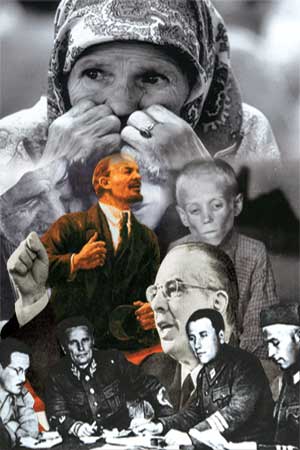 |
The last "Turkish Islamic Union" was the great Ottoman Empire. Since its collapse, the Islamic world has been divided into many nation states that remained, some for a prolonged period of time, under colonial rule. From 1920 onward, most of the Middle East, North Africa, the Indian Subcontinent, and the Muslims of Southeast Asia came under the rule of European colonial powers, in particular France and Britain. Muslims of Central Asia and the Caucasus first fell under the rule of the Russians and later on, and even worse, the Soviets. The Balkan Muslims came under the rule of such non-Muslim people as the Serbs and Croatians, whose rulers, after the Second World War, accepted communism.
In short, the majority of Muslims lived under colonial rule. With the end of colonialism in the 1950s and 1960s, Muslims began to achieve their independence. Britain first withdrew from the Indian subcontinent and then the Middle East. In the Indian subcontinent, India, West and East Pakistan (later to become Bangladesh), were created. In the Middle East, the various Arab nations gained their independence. In Southeast, Malaysia and Indonesia declared their independence in 1965.
At the end of the 1980s the Eastern Bloc disintegrated, and in 1991 the Soviet Union collapsed and many Muslim peoples won their independence. In Central Asia, the Muslim Turkish nations finally rid themselves of Russian/Soviet rule after 150 years and became independent republics. The end of communism also freed the Balkan Muslims. Bosnia-Herzegovina was freed from Serb-dominated Yugoslavia and emerged as a Muslim nation in central Europe, and Albania was freed from Enver Hoxha's oppressive and blood-thirsty communist regime.
Except for Muslims living as minorities in various countries or under occupation (e.g., Palestine and Kashmir), Muslims now rule themselves. This great political change made it possible to speak of a Turkish Islamic Union.
Irreligious Ideologies Are Losing Their Effect
Even though Muslim nations became independent from the 1950s onward, this did not necessarily mean that they had gained awareness. To the contrary, in some of these Islamic countries, ideologies opposing the central tenets of Islam became dominant. One example is Arab socialism, which deeply affected the Arab world in the 1950s-1960s. Suddenly, militant Arab nationalism that was incompatible with Islam's morality and based upon Marxist methods and rhetoric became prominent. Although, it receded almost as quickly as it had appeared, it wasted time and caused tension.
Apart from that, Muslim nations were scattered between extremes and were divided into two main camps dominated by America and the Soviet Union. Nevermind moving together, they were almost equally divided between these two poles. Most Arab countries were close to the Soviet Union. "Muslim" Egypt saw no problem in siding with India during its war with Muslim Pakistan. It only became possible to define the Islamic world as such in terms of politics, strategy, and culture after the cold war ended, when the "Islamic world" began to play an important role.
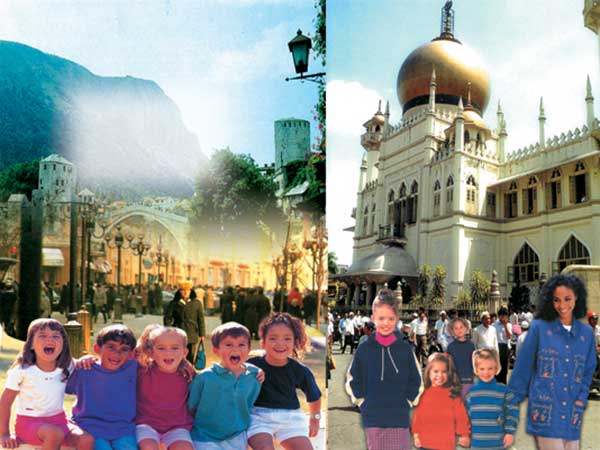 |
| During the twentieth century, major changes took place in the Islamic world: In 1950s and 1960s, many Muslim countries became independent, and in the 1990s, communism collapsed, which enabled most Muslims living under its system to achieve a better and more comfortable life. |
The process of cleansing the Islamic world from the remnants of the cold war era still continues. The developments taking place alongside this suggest that a more democratic and compassionate climate is taking shape, one that will create a more conducive atmosphere for a better understanding, telling, and practicing of the Qur'an's values. Traditional intra-Muslim differences are softening with recent developments in the Middle East, such as Iraqi Sunnis and Shi'ahs praying together in the same mosque for the first time in history.
Civilization Becomes Importan in International Relations
The end of the cold war ended the "compulsory" division of Muslims into two opposing political camps. Civilizations, instead of political ideologies, have begun to gain ground. As Samuel Huntington said, people were no longer defined by the question of "which side are you on?" but of "who are you?"53 For many people, spread out from the Balkans to Central Asia, and from the Far East to Africa, who previously had identified themselves as "socialist," "Yugoslav," "Soviet," "anti-communist," or "nationalist," it became more important to determine which civilization they represented.
Huntington's "clash of civilizations" theory, which expresses this fact, is important in this regard. Huntington predicted that the twenty-first century would be defined by civilizations, rather than nation states or political groupings, and that the dominating identity would be the "civilization" identity. And, he was right. He also correctly predicted that these civilizations would be based upon religion. However, he was wrong to suggest that conflict would determine the relationship between civilizations, for it is more likely that this relationship will be based upon friendship and cooperation. To make this happen, all that Huntington and others who think like him must do is to abandon the biased Social Darwinist worldview that misdirects them.
The end of the cold war is not the only reason for the world to be defined in terms of civilizations. Another important reason is the fall of atheism and the rise of religion. These developments are closely associated with the beginning of the collapse of the materialist philosophies, due to new social and scientific discoveries that are disproving them, that have had a cultural monopoly over the world for the past two centuries. In particular, scientific developments are eroding the roots of materialism, and this enables people to see the evidence for Allah's existence more clearly. At a time in which belief in Allah is gaining momentum and people are turning anew to religious morality, faith in Islam is also growing rapidly.
Everyone Is Talking About Islam
Another noticeable development is the universal recognition of the fact that Islam is the fastest growing religion in the world. Furthermore, Islam is the most important subject of current affairs. The situation of perhaps 30 or 40 years ago was altogether different. The world was thinking within the cold war's narrow ideological framework and many people believed, due to the materialistic worldview's influence, that religious morality could not be a defining factor in the lives of people and communities. But at the beginning of the 1980s, Islam suddenly became the most talked about subject on the planet, and the West realized that Islam's morality was a great power that could set people as well as nations in motion.
In the 1990s, the West's interest in Islam increased further, as indicated, in part, by the rise in the number of articles on Islam appearing in the media. The greatest interest in Islam came after 9/11, a tragedy that was totally contrary to Islam's morality. Westerners, in particular Americans, began to make great efforts to understand and know Islam closely. Currently, researchers and members of the media are very interested in Islam. Even though some of this research is biased, it is drawing the world's attention to Islam and causing many more people to look at its morality. (For further information, please see Harun Yahya, The Rise of Islam [Kuala Lumpur: A. S. Noordeen, 2003].)
Increasing Global Dialogue and Solidarity between Muslims
 |
| Islam is the most rapidly spreading religion in the world. Many people in the West are making an effort to learn about its morality and frankly express the admiration and interest they feel for Islam. |
Another important development that cleared the way for the Turkish Islamic Union is globalization, a process that began in the 1980s and gained momentum in the 1990s with the advancements in communications technology, in particular the Internet. Some Muslims view globalization as the carrier of Western culture, and thus consider it to be a negative development. In reality, however, this process enables the whole world to enter into an intense cultural dialogue with itself in a common language. Globalization also makes it easier for Muslims to access information and increase their cooperation and dialogue with each other to previously unseen levels. In effect, globalization has been an important catalyst for the Islamic world's ongoing enlightenment.
The Internet, an important gift to all of humanity, demonstrates the vast growth in dialogue between Muslims. Thanks to it, joint efforts expanded and the possibility of accessing information increased and diversified. As a result, whole new generations that think, read, develop ideas, and produce solutions were born across the world. Dr. Farish A. Noor, a Malaysian political scientist who teaches at Freie University of Berlin as visiting professor, says the following about globalization's effect on the Islamic world:
As a result of improving communications technology and facilitating the freeflow of information and knowledge, Muslims are now free (or freer) to go directly to the core of Islamic learning itself: The major texts, narratives and ideas of Islamic thought are no longer confined to rare books stored in remote libraries…
One of the consequences of this breakdown of traditional hierarchies and rigid educational structures is the creation of new Islamically-conscious and educated constituencies. Access to Islamic texts and knowledge has meant that Muslim women and lay Muslims are also allowed to learn, discuss and comment more about Islam. This is happening all over the Muslim world thanks to the creation of global Islamist networks... 54
To use Noor's terminology, "these are glimpses of a Muslim world where time and space no longer serve as barriers." 55
Both the Internet and the global media unite the world's Muslims. An event in one Islamic nation can be watched in all others at once, and thus becomes an issue for Muslims everywhere. All of these means demonstrate that the Islamic world can look forward to a much brighter future.
Westerners' Search for the Ottomans
As we have been stressing from the onset, creating the Turkish Islamic Union will benefit Muslims and non-Muslims alike and will have a just, democratic, and progressive nature. After its formation, other civilizations, especially the West, will be dealing with a stable and trustworthy authority with which they will be able to have friendly and peaceful relations. As the Turkish Islamic Union will be responsible for preventing and curing the radical elements that appear in the name of Muslims, the West will have no cause for such worries.
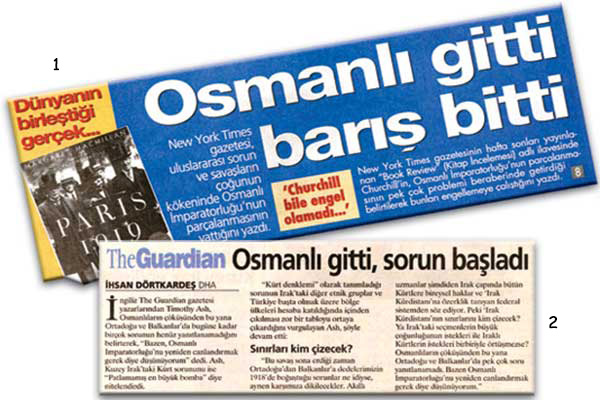 |
| 1. Daily Turkiye, 3.12.2002 (The truth on which the world is agreed... 2. Daily Milliyet, 28.4.2003 (The Guardian: As the Ottomans Left, the Problems Began) |
One sign that foretells this union's arrival is its necessity, which the West recognizes. A power vacuum on old Ottoman soil has been diagnosed, and the idea that setting up a similar system could cure the problem is finding a growing audience. As history shows, the Ottoman Empire brought peace and stability to this area. And, based upon this success, applying the Ottoman model to this troubled area will go a long way toward solving its current problems and unrest. For example, in his article, entitled "A World Still Haunted by Ottoman Ghosts" The New York Times (March 9, 2003), David Fromkin begins by saying that "A ghost has been haunting the United States. It is the specter of the Ottoman Empire" and continues:
Today, the more ambitious spirits in the Bush administration propose not merely to invade Iraq, but to use it as a base for transforming the Arab Middle East. Once before in modern times, Western countries—England and France—set about remaking these Ottoman lands. After emerging victorious from World War I, they redrew the map of the Middle East. Iraq was one of the artificial states to emerge.
After World War I, Britain and France, by defeating the Ottoman Empire, won control of the Arab lands, and with it, a tantalizing bauble: the likelihood that vast deposits of oil might be found there.
The Europeans and their American business partners hoped to establish stable and friendly regimes. After they redrew the borders in the early 1920's, Britain and France introduced a state system, and sought to supply political guidance too. But the system did not endure. Instead, the area grew more turbulent and unsettled.
Looking back, it is clear that many characteristics of the Middle East, some of which President Bush would like to change, were shaped by the five centuries of Ottoman rule.56
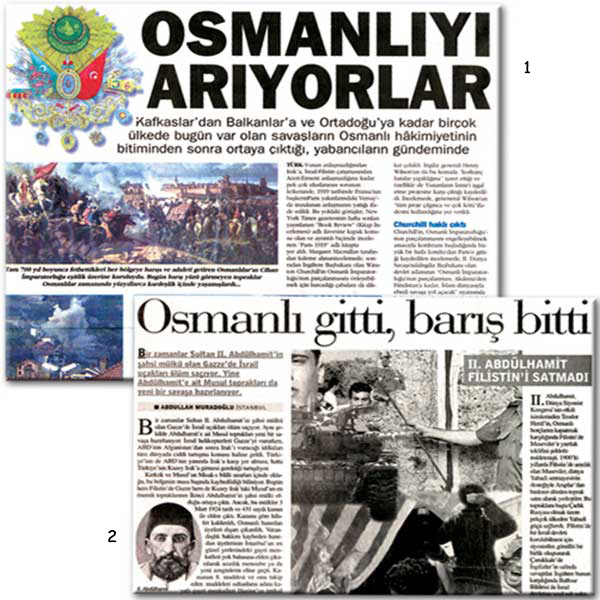 |
| 1. Daily Ortadogu, 4.12.2002 - THEY WISH THE OTTOMANS WERE BACK 2. Daily Yeni Safak, 18.12.2001 - (THE OTTOMANS LEFT AND PEACE CAME TO AN END) |
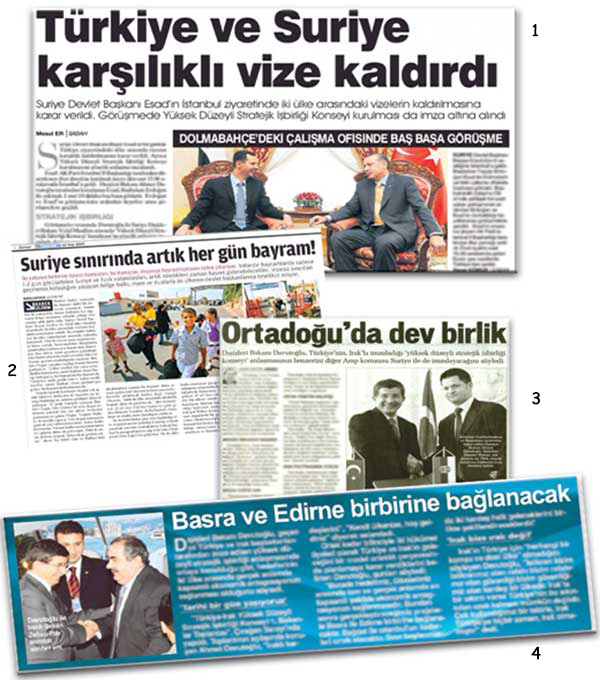 |
| 1. Daily Bugun, 17.09.2009 (TURKEY AND SYRIA HAVE LIFTED THE VISA REQUIREMENTS BETWEEN THEM) |
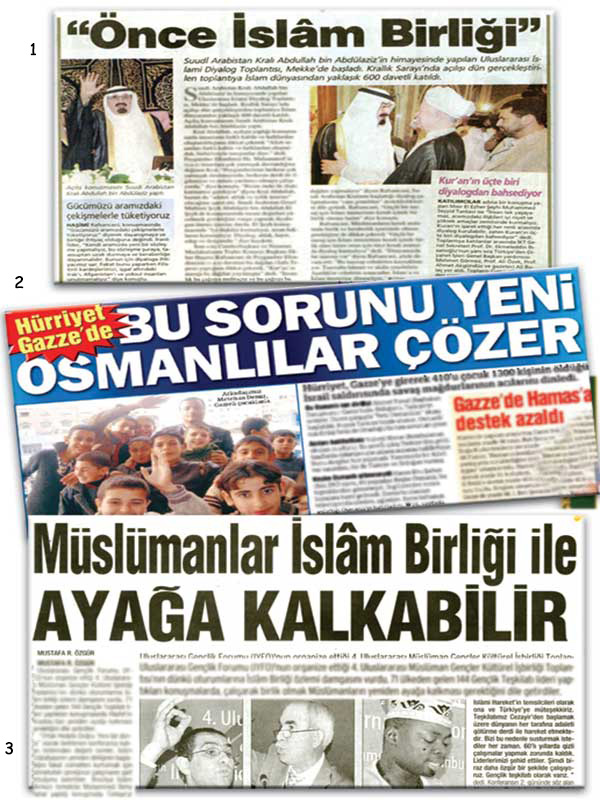 |
| 1. Daily Milli Gazete, 6.06.2008 (BEFORE ALL ELSE, TURKISH-ISLAMIC UNION) |
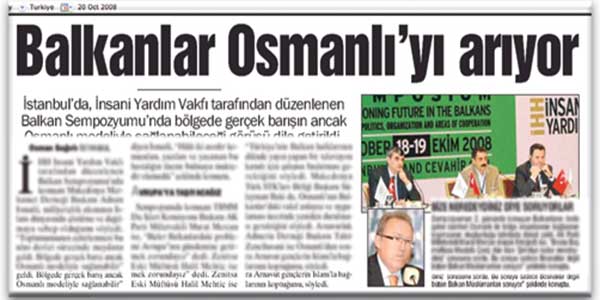 |
| Daily Turkiye, 20.10.2008 (THE BALKANS ARE LOOKING FOR THE OTTOMANS) |
British journalist Timothy Garton Ash expressed similar views in an article published in The Guardian (March 27, 2003). Ash, dealing with the problems of Albanians in Kosovo and the Kurds in northern Iraq, says "in both cases, we are still wrestling, nearly a century later, with the legacy of the Ottoman empire," and concludes:
Let's face it: when this bleedin' war is over, we'll be back in 1918, confronting many of the same questions in the same places that our grandparents wrestled with, from the Balkans to the Middle East. And we still don't have answers. Sometimes I think we should reinvent the Ottoman empire. 57
It is obvious that at a time when even the West is discussing how to reinvent the Ottoman Empire, Muslims should give it serious consideration. The developments taking place since the beginning of the fifteenth century Hijri show that Muslims are at a historic crossroad. We all must be worthy of this responsibility.
We are Making Step by Step Progress toward the Turkish-Islamic Union
There has been an apparent acceleration toward the formation of the Turkish-Islamic Union since this book was first published. The active role in foreign policy and fine results obtained by Turkey have confirmed that it must be the leader of the Turkish-Islamic world, while major steps have also been taken within the Turkish-Islamic world. These major advances include the acceleration toward the establishment of an Islamic Common Market, Syrian officials raising the question of lifting the border between Syria and Turkey, Iraqi leaders calling for unification with Turkey, the peoples of many Turkish-Islamic countries saying "We want the Turkish-Islamic Union," historic developments between Armenia and Turkey and the raising of the question of opening the border, headlines referring to the need of the world for a new Ottoman Empire, increased economic and cultural collaboration between Muslim countries, and a large number of reports in the foreign press referring to the need for Turkey as leader.
These developments will gather pace in the future, and the world will soon witness the foundation of the Turkish-Islamic Union.
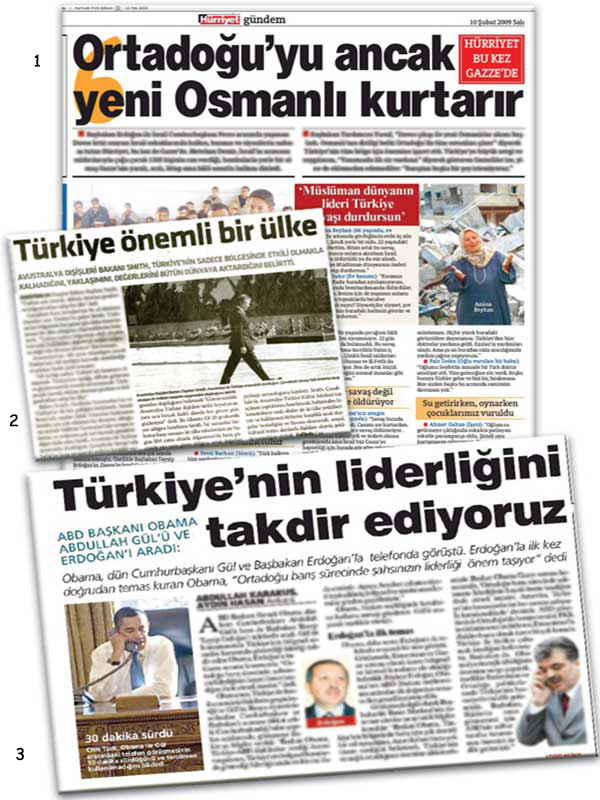 |
| 1. Daily Hurriyet, 10.02.2009 (ONLY NEW OTTOMAN CAN SAVE THE MIDDLE EAST) |
Footnotes
53. Anouar Boukhars, "The ‘global divide' is not Islam vs. America," Global Beat Syndicate (May 12, 2003).
54. Dr. Farish A. Noor, The Caliphate: Coming Soon To A Country Near You?The Globalisation of Islamic Discourse and its Impact in Malaysia and Beyond (Institut fur Islamwissenschaft; Freie Universitat of Berlin, 2000), 31. Online at: www2.ucsc.edu/globalinterns/cpapers/noor.pdf.
55. Ibid., 26
56. David Fromkin, "A world still haunted by Ottoman Ghosts," New York Times March 9, 2003.
57. Timothy Garton, The Guardian, March 27, 2003.
- Foreword to the Second Edition
- Foreword
- Introduction
- Islam Illuminates the World
- Why a Turkish Islamic Union?
- What Kind of Turkish Islamic Union
- The Benefits of Turkish Islamic Union for Muslims
- The U.S., the Middle East And the Turkish Islamic Union
- The Turkish Islamic Union and the West
- The Good News of the Turkish Islamic Union
- Conclusion
